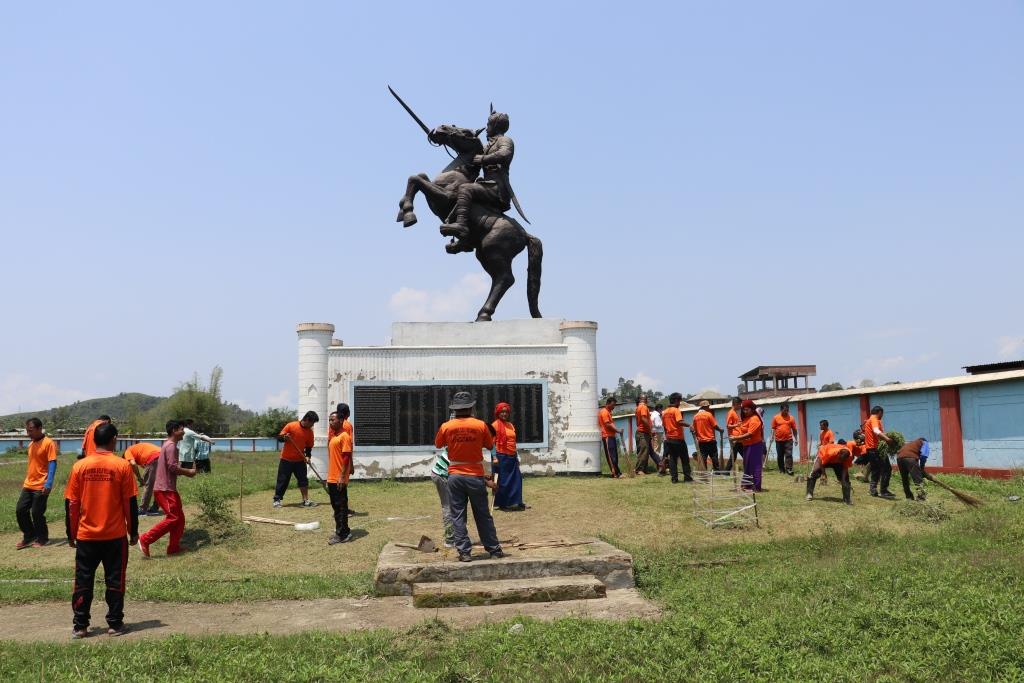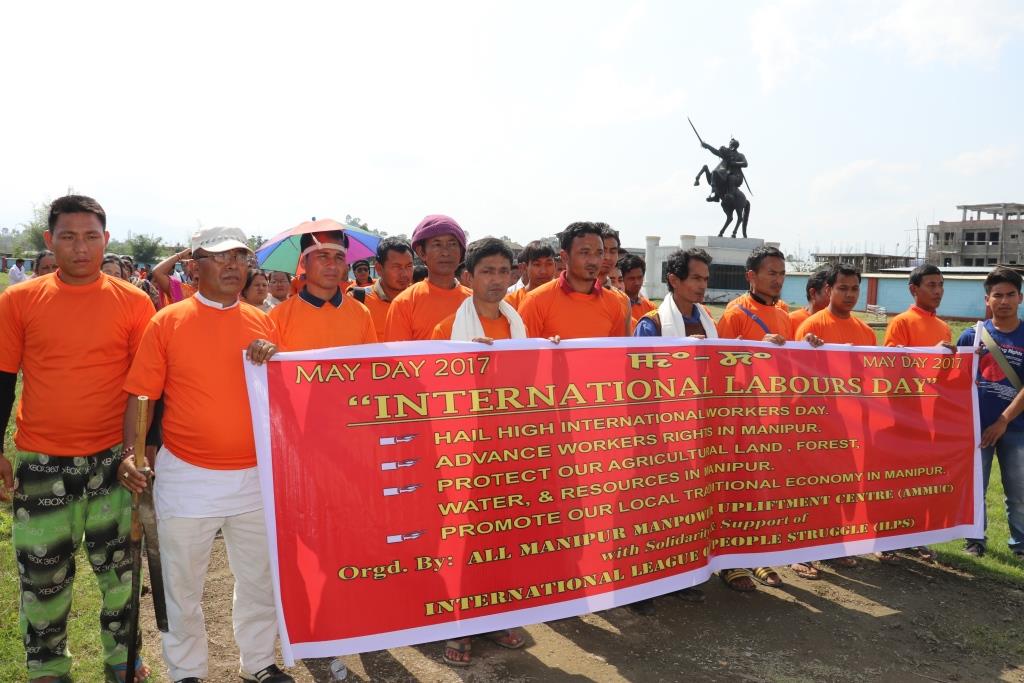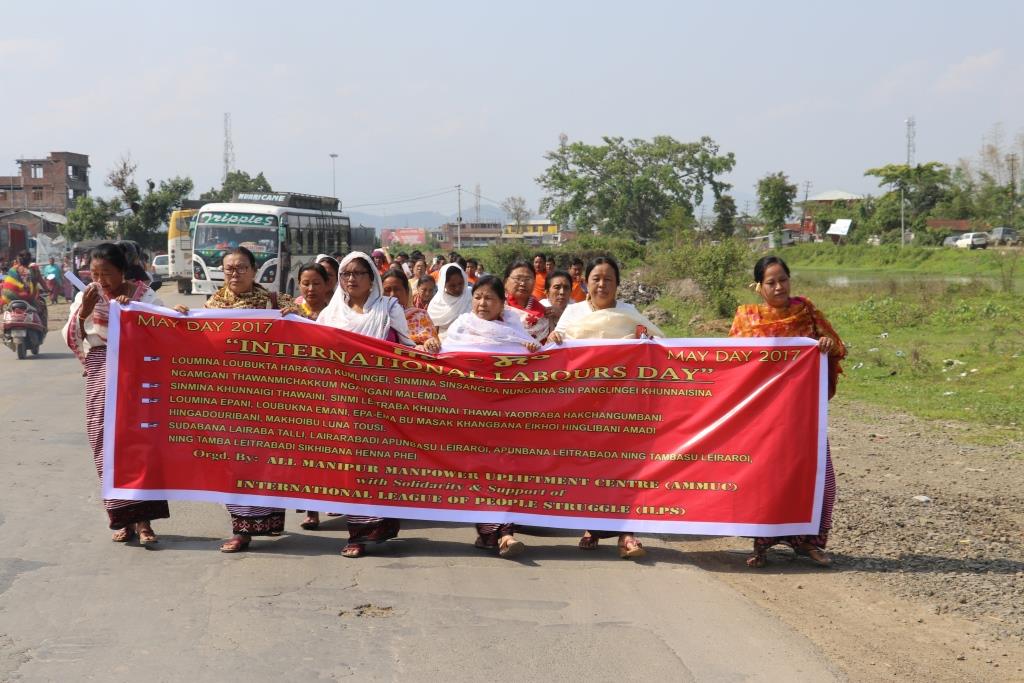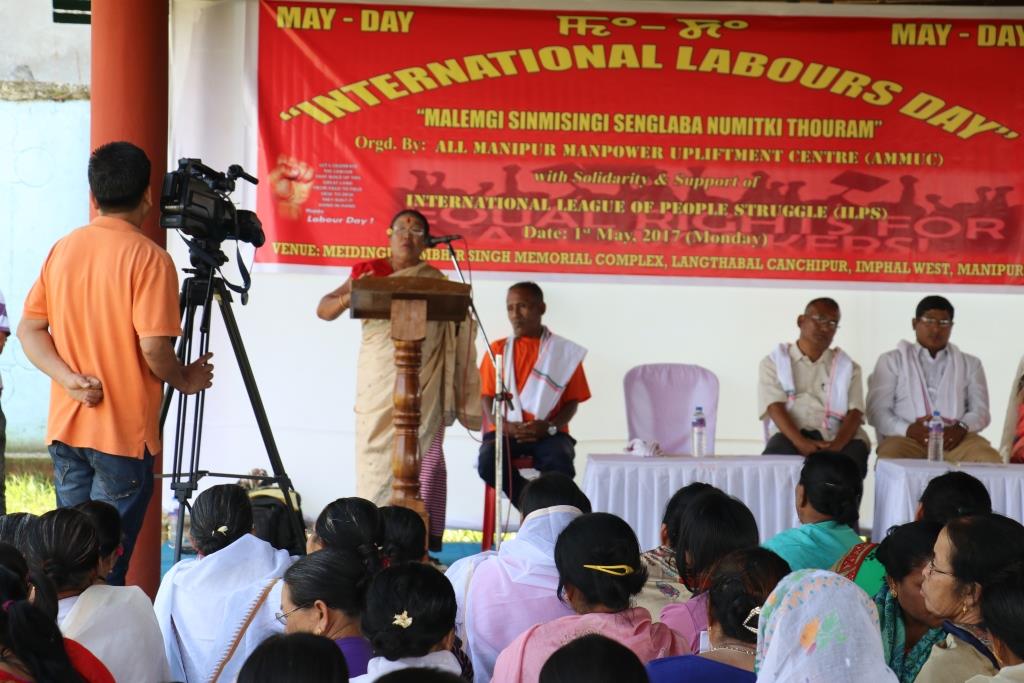We would like to convey the message of International Workers’ Day. The workers’ day, as it is being organised in various parts of the globe, we take this opportunity on the 1st May 2017, to organise the labour of our land to stand in unity to building a collective strength. This occasion also exemplifies our role in the workers’ movement across the globe and also adds inspiration to fulfilling the objectives of our struggle. We express our heartfelt gratitude to all those organisations and individuals who support us morally and physically.
 A worker is someone who lives by selling labour and constitutes the most important component of the society. The workers are distinctive and constitute the most important component of the forces of production that are essential for the development of society. The progression of social development is continued as long as workers enjoy development of their technology of production, skills, proper organisation and improvement of their economic livelihood.
A worker is someone who lives by selling labour and constitutes the most important component of the society. The workers are distinctive and constitute the most important component of the forces of production that are essential for the development of society. The progression of social development is continued as long as workers enjoy development of their technology of production, skills, proper organisation and improvement of their economic livelihood.
A society that could not create the necessary objective conditions— for the release of the forces of production that are essential for the production of the socially required goods and improvement of the relation of production— but remain outnumbered by people without regular job and income and without improvement of the economic livelihood of those who live by selling their labour; that society recedes into dependence and underdevelopment.
As we study the economy and condition of the workers of our society, we are extremely disappointed and worried.
 (1) First, the survival of our society is largely dependent on imported commodities. The government does not take up worthy initiatives to develop the means of production. No goods producing factory and industry are being established to reduce the degree of dependence on imported commodities. The government does not invest in any worthy programme to develop various sectors of skilled labour. The lack of proper policy to improve the means of production, relation of production and productive forces resulted into perpetuation of comparative backwardness of the society. Instead of heading towards overcoming the burden of dependence on import, the society is perpetually heading towards dependence. It will not be an exaggeration to point it out that the government is responsible for the dependency of the society.
(1) First, the survival of our society is largely dependent on imported commodities. The government does not take up worthy initiatives to develop the means of production. No goods producing factory and industry are being established to reduce the degree of dependence on imported commodities. The government does not invest in any worthy programme to develop various sectors of skilled labour. The lack of proper policy to improve the means of production, relation of production and productive forces resulted into perpetuation of comparative backwardness of the society. Instead of heading towards overcoming the burden of dependence on import, the society is perpetually heading towards dependence. It will not be an exaggeration to point it out that the government is responsible for the dependency of the society.
(2) Second, the responsibility of employing contract labours in the construction sectors— such as infrastructures for administrative conveniences, big projects by the outside companies, etc. — is rested in the personal choice of the private construction thikadars. In all the higher wage major construction works, the private thikadars imported outside labours who subsequently go outstate and deprive the ‘native’ labour of employment and higher wage. On the one hand the relation of production between the thikadars and labour is based on casual contract system, on the other hand it occurs in the unorganised sector. The contract system that functions in the interest of the thikadars exemplifies uncertainty in regards to security of employment, regularity of payment and chances of steady growth in wage. Because of the unorganised nature, there is difficulty in labour congregation and building up of a common union. The inability to build up strength cripples the labour into powerlessness and they could not effectively bargain for wage rise and facility. For all these reasons, our labourers remain weak and could not develop.
 (3) Third, other than the construction workers employed by the thikadars, the number of daily bread earners, who sell labour at sub-standard wage rate is increasing. There is emergence of daily wage earners whose daily income are irregular and too low, such as; porters at market and shops, cleaners at feasts and festivals, domestic helpers who are paid for drudgery household works, those who dig tanks and clean drainages, those who sell labour for seasonal cultivation works in private farms and gardens, underpaid helpers who work for master masonry and carpentry, underpaid apprentices, rickshaw drivers and pullers, impoverished barbers and cobblers, outsourced salespersons and street vendors, semi-skilled and skilled mechanics in small workshops, and etc. They are vulnerable to and badly affected by social unrests and political instabilities such as general strike, blockade and shutdown. They constitute the larger bulk of the labour force whose means of earning is instable, underpaid and lack facility in contrast to those who are employed in the organised sector.
(3) Third, other than the construction workers employed by the thikadars, the number of daily bread earners, who sell labour at sub-standard wage rate is increasing. There is emergence of daily wage earners whose daily income are irregular and too low, such as; porters at market and shops, cleaners at feasts and festivals, domestic helpers who are paid for drudgery household works, those who dig tanks and clean drainages, those who sell labour for seasonal cultivation works in private farms and gardens, underpaid helpers who work for master masonry and carpentry, underpaid apprentices, rickshaw drivers and pullers, impoverished barbers and cobblers, outsourced salespersons and street vendors, semi-skilled and skilled mechanics in small workshops, and etc. They are vulnerable to and badly affected by social unrests and political instabilities such as general strike, blockade and shutdown. They constitute the larger bulk of the labour force whose means of earning is instable, underpaid and lack facility in contrast to those who are employed in the organised sector.
 (4) Fourth, the government does not initiate any worthy scheme for the welfare of the workers. The meagre amount of daily wage is utilised to support family sustenance. It could not match with the living standard and facilities that are enjoyed by the rich. The impoverished labour class bears the burden of the steady increase in the prices of commodities, hospital expenses and medicines, electric supply, transport cost, educational costs, indirect taxes, foods and cloths, house maintenance cost, and other essential items. In this scenario, class contradiction becomes openly manifested— the condition of the labour class goes down at the bottom of the social hierarchy while the rich grows higher. Certain sections from amongst certain wealth category of peasant and working people, by sheer chance or by means of disposing of property to pay bribe, could get employment in either private or public service sectors. However, there is indication of permanent reservation of the most prestigious or highly paid jobs for the rich, which becomes openly visible. Instead of creating productive forces and promoting social equity to ensure peaceful co-existence, the degree of impoverishment the peasant and working people continues to grow. It will not be an exaggeration to point out that the government is meant for the rich to facilitate their accumulation of wealth, and, as such, there is hardly any agenda to take up adequate welfare schemes towards social development.
(4) Fourth, the government does not initiate any worthy scheme for the welfare of the workers. The meagre amount of daily wage is utilised to support family sustenance. It could not match with the living standard and facilities that are enjoyed by the rich. The impoverished labour class bears the burden of the steady increase in the prices of commodities, hospital expenses and medicines, electric supply, transport cost, educational costs, indirect taxes, foods and cloths, house maintenance cost, and other essential items. In this scenario, class contradiction becomes openly manifested— the condition of the labour class goes down at the bottom of the social hierarchy while the rich grows higher. Certain sections from amongst certain wealth category of peasant and working people, by sheer chance or by means of disposing of property to pay bribe, could get employment in either private or public service sectors. However, there is indication of permanent reservation of the most prestigious or highly paid jobs for the rich, which becomes openly visible. Instead of creating productive forces and promoting social equity to ensure peaceful co-existence, the degree of impoverishment the peasant and working people continues to grow. It will not be an exaggeration to point out that the government is meant for the rich to facilitate their accumulation of wealth, and, as such, there is hardly any agenda to take up adequate welfare schemes towards social development.
 There is no controversy about formulation that British rule in Manipur from 1891 to 1947 was a colonial rule. The objective of colonialism was British growth by suppressing us. By keeping us suppressed they achieved the agenda of colonial expansionism. They withheld the growth of our means of productions. They did not improve our productive forces. They did not promote us to develop to their level. On the contrary they transplanted and popularised a capitalist system, that is founded on the principle of unequal relation of production and social inequality, which become socially rooted in the form of a culture of class divide between the rich and poor. It remains a question if we are being ever liberated from this condition. How did our society become a territorial part of India? Are we living in a colonial condition similar to the British colonial condition? What could be the reason that the Government of India does not develop our means of productions and productive forces? Why it does not make effort in making our economy freed from dependency? Why is there no effort to improve the conditions of the peasant and working peoples? All these questions are now being raised.
There is no controversy about formulation that British rule in Manipur from 1891 to 1947 was a colonial rule. The objective of colonialism was British growth by suppressing us. By keeping us suppressed they achieved the agenda of colonial expansionism. They withheld the growth of our means of productions. They did not improve our productive forces. They did not promote us to develop to their level. On the contrary they transplanted and popularised a capitalist system, that is founded on the principle of unequal relation of production and social inequality, which become socially rooted in the form of a culture of class divide between the rich and poor. It remains a question if we are being ever liberated from this condition. How did our society become a territorial part of India? Are we living in a colonial condition similar to the British colonial condition? What could be the reason that the Government of India does not develop our means of productions and productive forces? Why it does not make effort in making our economy freed from dependency? Why is there no effort to improve the conditions of the peasant and working peoples? All these questions are now being raised.
 We are witness to the objective conditions of dependency (marked by survival at the mercy of Delhi that controls the economic string) and terrorism perpetrated by the reactionary forces or regular troops that enjoy the protection of draconian laws, which are being deployed to protect extractive projects in the name of Act East Policy and development. Are we going to perish without any chance of enjoying the rights enshrined in the Universal Declaration of Human Rights 1948? Do we really enjoy the rights prescribed by the International Covenant on Economic, Social and Cultural Rights? While living under the political system of India, will it be possible for us to achieve the agenda of eradication of poverty and promotion of sustainable development as envisioned in the UN Sustainable Development Goal; Agenda 2030? Are we going to be refugee in our land? What is the role of the wealthy sections of the citizens who live amongst us? These are the important questions that are being raised in order to arrive at practical solutions to the prevailing conditions of dependence and burdens that are being faced by the working people. The search for a collective solution is of utmost necessity in order to address the basic grievances of the working individuals who constitute the marginalised class. The working people had to find answers to take up the leading role towards development of the society.
We are witness to the objective conditions of dependency (marked by survival at the mercy of Delhi that controls the economic string) and terrorism perpetrated by the reactionary forces or regular troops that enjoy the protection of draconian laws, which are being deployed to protect extractive projects in the name of Act East Policy and development. Are we going to perish without any chance of enjoying the rights enshrined in the Universal Declaration of Human Rights 1948? Do we really enjoy the rights prescribed by the International Covenant on Economic, Social and Cultural Rights? While living under the political system of India, will it be possible for us to achieve the agenda of eradication of poverty and promotion of sustainable development as envisioned in the UN Sustainable Development Goal; Agenda 2030? Are we going to be refugee in our land? What is the role of the wealthy sections of the citizens who live amongst us? These are the important questions that are being raised in order to arrive at practical solutions to the prevailing conditions of dependence and burdens that are being faced by the working people. The search for a collective solution is of utmost necessity in order to address the basic grievances of the working individuals who constitute the marginalised class. The working people had to find answers to take up the leading role towards development of the society.
Long Live International Workers’ Day
Love Live People’s Democracy
Organised with Solidarity and Support from the International League of Peoples’ Struggle
Organised by the All Manipur Manpower Upliftment Centre
Starting Venue: Maharaja Gambhir Singh Memorial Complex,Langthabal Kunja, Canchipur, Imphal.



